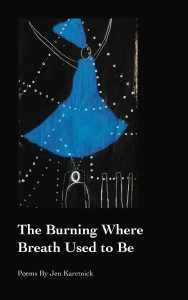 Review by Sherre Vernon
Review by Sherre Vernon
Jen Karetnick is a widely published, award-winning poet, essayist, and journalist. She earned her MFA in poetry from University of California, Irvine, and an MFA in fiction from University of Miami. She is a co-founder/co-editor of the daily online literary journal, SWWIM Every Day (www.swwim.org) and the author of five full-length poetry collections: Hunger Until It’s Pain; The Burning Where Breath Used to Be, The Treasures that Prevail, American Sentencing and Brie Season. Recent recognition of her work includes: the 2020 Tiferet Writing Contest for Poetry, the 2018 Split Rock Review Chapbook Award and the 2017 Hart Crane Memorial Poetry Contest.
The Burning Where Breath Used to Be opens with a poem entitled “23andMe Says My Body Is a Sanctuary City,” which reads as a prolonged dedication of the book to the author’s history and as a map of the poems that will follow it:
for those who tunneled from Poland to Austria, rabbits barely ahead of dachshunds
for my great-grandmother who drove her children to the coast in a covered wagon…
for those whose tastes divide along the roots of the bitter…
whose ring fingers are longer than subversive curses (17)
In this first poem, we meet all of the collection’s principal themes: separation from and connection to family; the body as home to illness; the power and shame of the collective body politic. In this poem, too, we encounter the book’s key aesthetics: a nod toward verse form held in the tension between pop and academic cultures. Karetnick’s intellectual engagement with content and form asks us to take The Burning seriously. Moreover, in this opening salvo, Karetnick introduces the hard questions—clearly, directly, and with eye contact.
The thematic content in The Burning is not organized by section. Rather, each theme opens early in the collection and is woven through to the end, like overlapping sine waves or spiraling helix. “Borromean Rings” unravels three estranged siblings. “Sonnets for Code Red” is a point on the curve of the classroom. “My Husband Shoots Me” travels the line of the chronically ill body. Each of these recurring themes is decidedly personal. Taken together, they are unmistakably political. It is as though Karetnick is entreating: What are the demands we make of ourselves? How do we—can we—protect and care for our children? Is it enough to set the structures in place? Is it enough to mourn? To her own questions, Karetnick offers no clear answers, only so much reaching:
If only I had hung up on the full-throated thunder…
Before both sides of the windshield wept (82)
The Burning Where Breath Used to Be gasps under the weight of human suffering. By coming alongside Karetnick as she organizes pain into sonnets, taxonomies, apologies and sestinas, we join her in rituals toward healing. By joining her in prose poems, anecdata, wishes, we join her rebellion against “the whole, sticky mess” (94) of loss.
The Burning Where Breath Used to Be by Jen Karetnick
David Robert Books, 202, $19
ISBN 9781625493545
Sherre Vernon (she/her/hers) is the author two award-winning chapbooks: Green Ink Wings (fiction) and The Name is Perilous (poetry). Her work has nominated for Best of the Net and anthologized in several collections, including Bending Genres, Fat & Queer and Best Small Fictions. In 2019, Sherre was a Parent-Writer Fellow at MVICW. Readers describe her work as heartbreaking, richly layered, lyrical and intelligent. To read more of her work visit www.sherrevernon.com/publications and tag her into conversation @sherrevernon.
